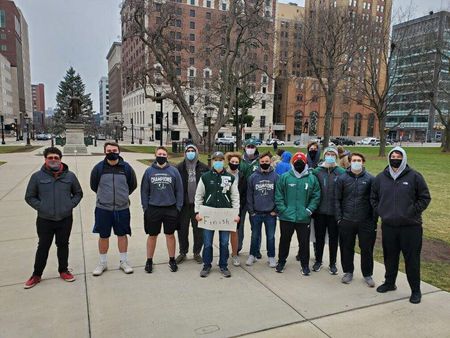SALEM, OR— On Presidents Day, February 17, 2025, hundreds of demonstrators assembled outside the Oregon State Capitol to voice their opposition to former President Donald Trump and tech mogul Elon Musk. The rally, which drew roughly 1,000 participants, was part of a nationwide wave of protests targeting both figures and their influence on U.S. government policies.
The protesters, many holding signs and chanting slogans such as “Stop the coup!” and “This is what democracy looks like,” made it clear that their grievances extended beyond politics. Some carried American flags displayed upside down, a symbol historically used to signify distress and a call for change. The demonstration was not only a statement against Trump’s administration but also a critique of Musk’s involvement in federal government affairs, which protesters believe has led to excessive privatization and corporate influence in policymaking.
The rally in Salem mirrored similar protests across the country, with notable demonstrations taking place in Portland and Vancouver. In both cities, participants expressed frustration over the direction of the nation under Trump’s leadership and the growing power of individuals like Musk, whose ventures now intersect with federal decisions on everything from space exploration to electric vehicles.
“We’re here to reclaim democracy,” said one protester, who wished to remain anonymous. “We can’t let billionaires control our future, and we can’t let a corrupt government undermine our rights.”
The protests reflect broader public concerns about the influence of corporate leaders on government policy, as well as the erosion of democratic norms under the Trump administration. Musk, whose ventures have expanded into multiple sectors including space exploration, transportation, and energy, has become a polarizing figure, with critics accusing him of using his wealth to shape national policies that benefit his businesses.
Similar protests were reported in other states, with demonstrators also calling for greater accountability from public officials and private individuals whose financial power is seen as increasingly linked to political decisions. As the protests continue to unfold across the nation, the message remains clear: many Americans are eager for a shift in leadership and a return to democratic principles that prioritize the needs of the people over corporate interests.
The demonstration in Salem concluded peacefully, but with a sense of determination, as the protesters left their marks on the state capital with banners and voices raised against what they call a growing crisis of governance. The rallies are expected to continue in the weeks ahead, with organizers promising more action in the coming months.
As the nation watches, the impact of these protests on the political landscape remains uncertain, but one thing is clear: the desire for change is palpable, and the voices of the protesters are only growing louder.











